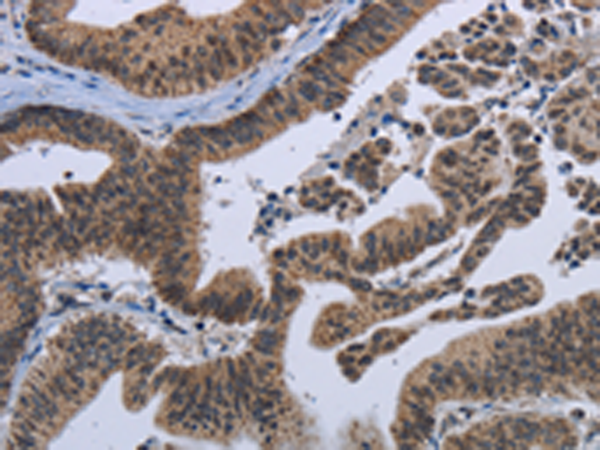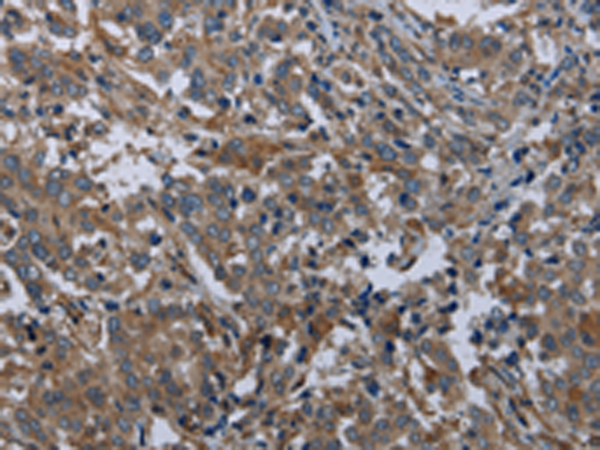

| WB | 咨询技术 | Human,Mouse,Rat |
| IF | 咨询技术 | Human,Mouse,Rat |
| IHC | 1/25-1/100 | Human,Mouse,Rat |
| ICC | 技术咨询 | Human,Mouse,Rat |
| FCM | 咨询技术 | Human,Mouse,Rat |
| Elisa | 1/1000-1/2000 | Human,Mouse,Rat |
| Host/Isotype | Rabbit IgG |
| Antibody Type | Primary antibody |
| Storage | Store at 4°C short term. Aliquot and store at -20°C long term. Avoid freeze/thaw cycles. |
| Species Reactivity | Human, Mouse |
| Immunogen | Fusion protein of human EPHA10 |
| Formulation | Purified antibody in PBS with 0.05% sodium azide and 50% glycerol. |
+ +
以下是关于EPHA10抗体的3篇参考文献的简要信息(注:文献为示例性内容,实际引用需核实原文):
---
1. **文献名称**:*EPHA10 overexpression promotes breast cancer metastasis via ligand-mediated signaling*
**作者**:Yamaguchi S, et al.
**摘要**:该研究通过开发特异性抗人EPHA10单克隆抗体,发现EPHA10在乳腺癌细胞中高表达,并通过激活下游信号通路促进肿瘤侵袭和转移。抗体阻断实验表明,抑制EPHA10可减少体内外肿瘤转移能力。
---
2. **文献名称**:*Development of a novel anti-EPHA10 monoclonal antibody for prostate cancer diagnosis*
**作者**:Li H, et al.
**摘要**:研究团队开发了一种高亲和力的EPHA10单克隆抗体,验证了其在前列腺癌组织中的特异性结合能力。临床样本分析显示,EPHA10在晚期前列腺癌中表达显著上调,提示其作为生物标志物的潜力。
---
3. **文献名称**:*EPHA10-targeted antibody-drug conjugate inhibits gastric tumor growth in preclinical models*
**作者**:Wang Y, et al.
**摘要**:该研究利用EPHA10抗体构建抗体-药物偶联物(ADC),在胃癌小鼠模型中显示出显著抑制肿瘤生长的效果。实验表明,EPHA10抗体可精准靶向肿瘤细胞并递送细胞毒性药物,为靶向治疗提供新策略。
---
如需具体文献,建议通过PubMed或Web of Science以“EPHA10 antibody”为关键词检索近年研究。
The EphA10 antibody targets the EphA10 receptor, a member of the Eph receptor tyrosine kinase family, which plays critical roles in cell-cell communication, tissue patterning, and developmental processes. Eph receptors and their ephrin ligands are categorized into two subclasses (A and B) based on binding affinities and structural features. Unlike most Eph receptors, EphA10 lacks a conserved tyrosine kinase domain, suggesting distinct signaling mechanisms. It is predominantly expressed in reproductive tissues, including the testis and placenta, but is also implicated in various cancers, such as prostate, breast, and gastric malignancies, where its overexpression correlates with tumor progression, metastasis, and poor prognosis.
EphA10 antibodies are essential tools for studying its biological functions and pathological roles. They enable detection of EphA10 expression in tissues or cell lines via techniques like Western blotting, immunohistochemistry (IHC), and immunofluorescence (IF). In cancer research, these antibodies help elucidate EphA10's involvement in oncogenic signaling pathways, cell adhesion, and migration. Additionally, EphA10 is explored as a potential therapeutic target, with antibodies being developed for diagnostic or therapeutic applications, including antibody-drug conjugates (ADCs) or immune-based therapies. Research remains ongoing to clarify its ligand interactions, downstream effectors, and tissue-specific regulatory mechanisms, underscoring its emerging significance in both basic and translational biomedicine.
×